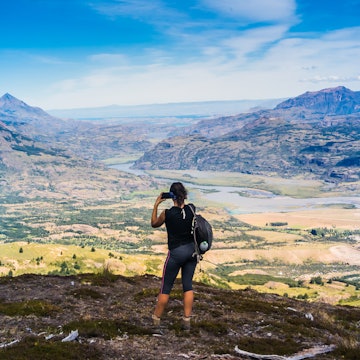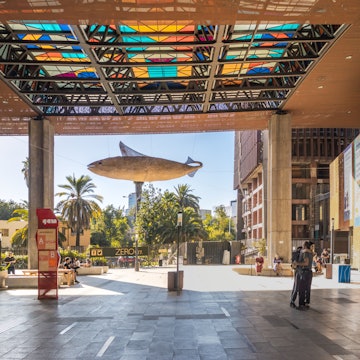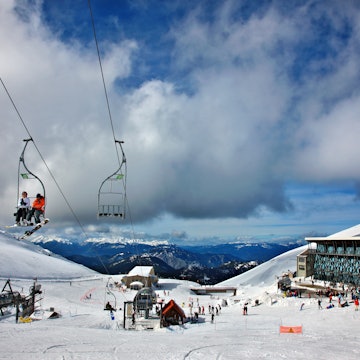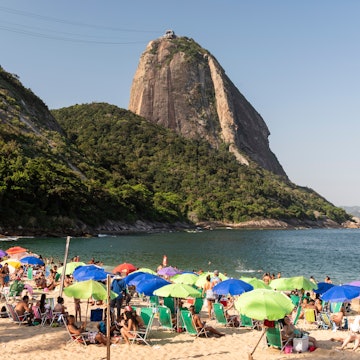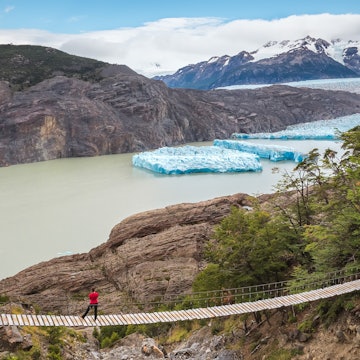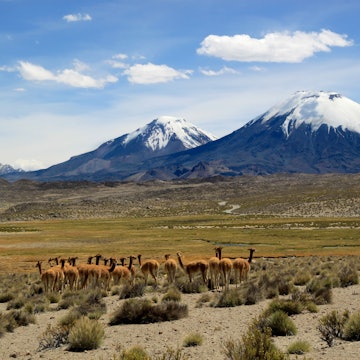

Magic, mysticism and inspiring contradictions seem to surround Isabel Allende. She is arguably Chile’s most famous living writer, and yet, she doesn’t live permanently in her homeland, opting instead to continue her exile, which dates back to the dangerous days following Salvador Allende’s removal from office in the 1973 coup d’etat.
Her relationship to the socialist president – he was her father’s cousin, thus her uncle once removed – coupled with her work as a journalist and commentator, necessitated her hasty departure from her homeland. But Chile still remains front and center in her life and her work, and Allende returns for several months most years to revisit and reconnect with the land and people that inspire her.

As a writer, Allende has enjoyed massive success. Her books have been translated into 35 languages, selling more than 65 million copies worldwide. She is perhaps most famous for the novels The House of the Spirits and Eva Luna, but she’s authored more than 20 books over her long career, winning countless international accolades for her work, which draws its inspiration not just from her past, but also from the idiosyncrasies and intricacies of her homeland’s landscape and people.
We caught up with Allende to understand Chile – Lonely Planet’s best country to visit in 2018 – through her eyes.
Lonely Planet: So, what do you think the best thing is about the Chilean people?
Isabel Allende: Hospitality... I think we're very hospitable people, especially with foreigners. Not so much with each other. But you'll always find opened houses and people ready to welcome you. You know people just drop in, you don't need to call or be invited. Just drop in. As soon you cross the threshold of a Chilean house you'll be offered something to drink. Even in the most modest house, where they have nothing, they will offer you tea or water or whatever they have. I think that's our nicest trait.
LP: So if that's the nicest trait, then what's the worst trait?
IA: Ha!
LP: … the secret thing that every Chilean knows about themselves but is afraid to admit?
IA: We have a sort of a social class system that is like [the caste system] in India. No one talks about it, and it's very subtle. You have to be Chilean to understand. But when you meet someone you immediately classify people, you know where they belong. Now it is more permeable, because society has changed, it's more modern. There are influences from foreigners, and it's more open. But I grew up in a very strict social system. We still have a very narrow mentality for many things. The weight of the Catholic Church is still there. Politically, we're a very progressive country; socially, however, we're not.
LP: Can you take me through the regions?
IA: I’ve been deep south, but not to Antarctica. I'd start in Patagonia. It's wonderful… very expensive because it's very far away, very isolated. But Torres del Paine’s beautiful mountains are stunning, and if you can get there it's just gorgeous. That’s the kind of ecotourism that many Europeans do, but few Chileans can afford it.
Then as you go up you go through the regions of the lakes, of the volcanoes, of the forests – that's the most beautiful part of Chile. You’ll find wonderful food, seafood on the coast, great restaurants – there is some German influence you know so you can find great apple pies!

Then as you get to Puerto Montt, you can cross over to Chiloe, an archipelago of several islands – I mean, hundreds of small islands and one big island. It's a fascinating place to me… Although now you have television, they're building an airport, it's quite different from what it was a few years ago. Because it was so isolated for a long time, it is still very rural, everything happens by the sea, by water, so the islands are connected by boat, and each island is very particular. It's like going back 50 years, and it's very beautiful.
And then as you come up you'll find several provinces that I think are great. For example Valdivia... It rains all the time so it's green and beautiful. This is where the Indian reservations are – the Mapuche reservation – and it's very interesting in that sense.
And then you go to the central part of the country where the agriculture is and the industry and then Santiago. Santiago is a huge city, half the population of the country lives in Santiago.

LP: What defines Santiago as a city?
IA: There are several abstractions. I've never done tourism in Santiago… I grew up there. People who grow up in a place never do tourism, but Pablo Neruda has a house there. The great Chilean poet has three houses – one in Valparaiso, La Chascona [in Santiago], and the other is in Isla Negra. And you really have to go there because that's on the coast, which looks very much like the Pacific coast here in California.
Santiago has also the Cerro Santa Lucia [a hillside park], which is very nice. And there's the huge Cerro San Cristobal, which they consider a mountain, but it isn't – it's a big hill. There are also certain political highlights. For example, of course, La Moneda, the presidential palace that [was bombed] during the military coup on September 11, 1973. It's a piece of our history that's very interesting. And then there are many cultural centers and there are some barrios (neighborhoods) that are lovely. For example, Bella Vista is a neighborhood of art that's a very nice place.
Then I would go up north to La Serena with its beautiful beaches. But the best part in the north, in my opinion, is San Pedro de Atacama. I have been there several times. The first time I went there, there was no road. It looked like the moon… fascinating! And now they have great hotels, not fancy but eco-hotels. And for eco-tourists, San Pedro is the most magic place.

LP: What do you think you see that Chileans don't see about their country?
IA: Oh, I don't think they see themselves at all. It’s like we look at ourselves in the mirror and we see only the defects – that happens in Chile. They don't see themselves to understand what a great country we are. People are complaining all the time. This country is probably the one that's the best in all of Latin America. Social, political and economic stability. Also great inequality. The rich are the richest in the world and the poor... the difference between the rich and poor is huge. But you don't find extreme poverty… just very small pockets of extreme poverty. When I lived in Chile, in the 70s, it was a poor country, so we have progressed a lot. And we're a great country in many, many ways.

LP: So that [pessimism] would be a central characteristic of the Chilean person?
IA: No, I wouldn't say an essential characteristic, no. It's part of our character. The other thing that will surprise you is that people never brag in Chile. So when I come to the US, when my husband – my husband brags – it drives me nuts, because for me it is such a horrible thing to say anything good about oneself. And that's very American. Chileans always speak in diminutives; we don't say 'agua' we say 'aguita'. Everything is small. It’s part of our modesty. Everything that is about ourselves and about our country and about whatever is ours, is always not too good. Even if we think that's very good, we won't say it. Then our sense of humor is very dark. Very much like Jewish humor: self-deprecating, cruel, black, black humor.
LP: I think a lot of people come from Europe and the US and go to Chile expecting salsa dancing and boisterous people, but they get the exact opposite.
IA: Maybe I'm generalizing – of course, I'm generalizing – but when I think of Venezuela, I think of people drinking and dancing; when I think of Chile, we're all sitting talking politics.








